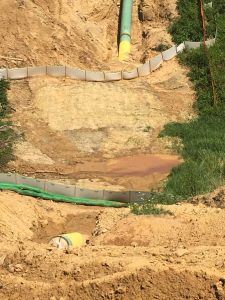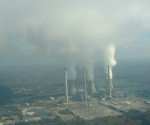
SM80 pipeline construction in Wayne County.
Hey friends and allies: we are all appalled by the rapid approval of oil and gas infrastructure projects in West Virginia and the surrounding region, right? Don’t just sit back and take it! One thing you can do right this moment is write a letter to the editor, and name one of your elected officials in that letter. This as been proven to get their attention, and they just might pay more attention to your words in a published format then they would in a written or verbal comment you send to them (although those are good, too). If you need help finding information on your local news service, or some tips on writing a letter, see here.
Here is a sample LTE, which you can use for inspiration. Please use your own words and focus on your most immediate concerns.
Here is another example of a current LTE which I am in the process of submitting:
Late on Friday, July 28, the Federal Energy Regulatory Commission (FERC) released the Mountaineer Xpress Pipeline’s (MXP) final Environmental Impact Statement (EIS).
This proposed 36-inch, high-pressure pipeline would require at least a 50 foot wide right of way, meaning major destruction of forests, pastures and wetlands along a 165 mile path, from Marshall to Cabell counties. In Cabell and Wayne counties, the SM-80 will complete the gas transmission through West Virginia.
FERC is concerned enough about this major project, (the second largest transmission line proposed for the north-eastern U.S.!), to issue recommendations that encourage further mitigation of wildlife and water ecosystem destruction. Yet, FERC has not denied the pipeline’s permit. Why? FERC has essentially rubber stamped such permits since its inception in 1977, only denying one pipeline permit in that entire time.
I call on Senator Manchin to ask some serious questions to FERC about this issue.
What can landowners or concerned citizens in the path of the MXP do? Contact ohvec.org for more information and guidance on finding resources to resist the occupation of your land and communities by this multi-national corporate entity (TransCanada owns rights to this project and others that Columbia Gas is propagating).
Pipeline advocates may say West Virginia needs this gas; please inform them that the quaintly named Mountaineer Xpress project is connected to the more accurately named “Gulf Xpress” project, which will transport the gas away from WV, to the Gulf coast primarily for export shipments.
In a nutshell, if you focus on a concern that is near and dear to your property (and heart), name an elected official whom you think can do something about it, and follow the guidelines of your local news service, you are likely to get published.
Wouldn’t it be amazing if we had a bunch of letters printed in editorial pages across the state, calling out our elected officials, on a continual basis for a few months?
If you need more help or guidance on LTE submissions, or if you want to write a guest blog for OVEC, perhaps featuring your published LTE, please contact us.












